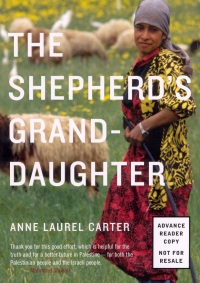| ________________
CM . . .
. Volume XV Number 3. . . .September 26, 2008 
 |
The Shepherd's Granddaughter.
Anne Laurel Carter.
Toronto, ON: Groundwood/House of Anansi, 2008.
222 pp., pbk. & hc., $12.95 (pbk.), $17.95 (hc.).
ISBN 978-0-88899-903-0 (pbk.), ISBN 978-0-88899-902-3 (hc.).
Subject Headings:
Wolves-Juvenile fiction.
Palestine-Social
conditions-21st century-Juvenile fiction.
Shepherds-Juvenile fiction.
Grades 6 and up / Ages 11 and up.
Review by Gregory Bryan.
***½/4
Reviewed from Advance Reading Copy.
|
| |
|

excerpt:
"I thought you might need some intelligent conversation," he said.
"I have the sheep for that. Food would be nice."
He dug in his pocket and offered her a handful of figs. "How did I know."
"Are they past our house?"
He nodded, avoiding her eyes.
The bulldozers had been digging through their fields. Amani was glad to get away from the noises, the cracking vines, the falling canopies, the shovels dumping the heart of their vineyards into a truck.
"Did you watch?"
Omar popped a fig in his mouth. Amani knew from his twisted face that he had, hating the Israeli soldiers and the workmen and how they did what they wanted. Omar hated being powerless to stop them. Amani understood.
Anne Laurel Carter's new novel, The Shepherd's Granddaughter, is a hard-hitting, thought-provoking, troublesome book. The Shepherd's Granddaughter centres upon the issue of Israeli-Palestinian relations and the on-going conflict over land. As such, this is not a book to be treated lightly. It demands of its audience maturity and a willingness to give the book due consideration. At the same time, however, Carter's book is also simply a story well told.
Amani and her extended family live outside a Palestinian village on land that has been home to her ancestors for over a thousand years. The story begins with Amani as a little six-year-old girl who loves to spend time helping her grandfather, Seedo, tend to the family flock of sheep. In a culture driven by traditions, Amani's cousin, Wardeh, exclaims, "Girls can not be shepherds. When summer's over, you'll forget all about those stupid sheep." Amani, however, does not forget about the beloved sheep. So it is that, after Seedo's death, the teenaged Amani inherits the responsibility of looking after the sheep, shepherding them to feed in the low mountains above the family olive groves, keeping the sheep safe from hungry wolves.
Amani has learned much from her grandfather. "You show an animal, especially a ram, the way you want him to go," Seedo instructed. "Guide him there with your arms, your voice and, especially, Amani, your spirit."
Upon Seedo's death, the responsibility of family leadership falls to Amani's volatile uncle, Ammo Hani. Together, the family watches and waits as Israeli settlers intrude further and further onto the traditional land of Amani's forebears. Against the heavily armed and aggressive Israeli soldiers, the Palestinians are powerless to resist the encroachment. Yet Ammo Hani and Amani's brother, Omar, press for militant resistance. Others urge patience and non-violent resistance. Amani eventually decides that patience comes only to "those who can forget." Amani, however, is not able to forget the suffering inflicted upon her family.
One of the values of Carter's book is that it presents events from the Palestinian perspective. What little is told in the Western World of the Israeli-Palestinian conflict tends most often to carry a bias toward the Israeli perspective, coloured with the guise of Biblical Promised Lands. Young readers should be reminded that this book presents just one side of what is a complex, bloody story. The ills of the world will not be solved through the mere reading of books, but I think that Carter's work provides an opportunity for middle and high school readers to gain further information about their world, helping to make them more knowledgeable, understanding (and, I suspect, compassionate) people.
At book's end, Carter includes a glossary of Hebrew and Arabic terms, further adding to the educative value of the book. For a well told, highly engaging, educational, yet troublesome book, The Shepherd's Granddaughter is one that I highly recommend.
Highly Recommended.
Gregory Bryan teaches in the Faculty of Education at the University of Manitoba, in Winnipeg, MB.

To comment
on this title or this review, send mail to cm@umanitoba.ca.
Copyright © the Manitoba Library Association. Reproduction for personal
use is permitted only if this copyright notice is maintained. Any
other reproduction is prohibited without permission.
NEXT REVIEW |
TABLE OF CONTENTS FOR THIS ISSUE
- September 26, 2008.
AUTHORS |
TITLES |
MEDIA REVIEWS |
PROFILES |
BACK ISSUES |
SEARCH |
CMARCHIVE |
HOME |
